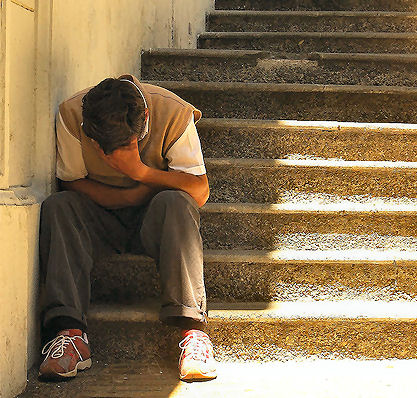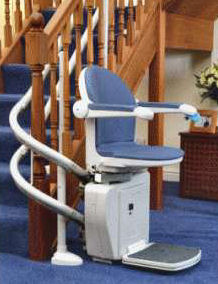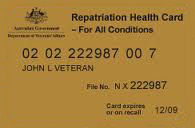|
Radschool Association Magazine - Vol 35 Page 11 |
|
Privacy Policy | Editorial Policy | Join the Association | List of Members | Contact us | Index | Links | Print this page |
|
Health and Life style. |
|
Letting men grieve as men.
Dr John Ashfield
However
you choose to frame it, grief is not the kind of experience you
would go looking for, a confusion of painful emotions, physical
upheaval, having your vulnerability on public display. But grieve we
must and will, because grief follows most significant losses in our
lives-especially
Women are usually quite adept at seeking out support for themselves and supporting each other. They tend to relieve their emotional pain through open expression of it, and by verbalising it in the company of others. Men may have to choose more consciously to allow grief emotions to surface, and will usually need a private or "safe" ritual space (like a cemetery) in which to experience them, and the healing that brings. Taking time out alone in the natural environment, to be open, vulnerable, and reflective, can also be very healing for men.
An effective and characteristically male way of responding to the emotions of grief is by "pushing them out" into actions and activities-often ritualised activities. Men commonly choose to create or build something, or employ a simple ritual, to mark and value in some way (or to commemorate) the death of a person and the passing of things associated with them. Yet however men choose to engage, express and find healing in their grief, there must always be room to "take a break" from its intensity.
Neither ignoring grief, nor remaining in it continually, best achieves healing. Taking time out to focus on the practicalities of attending to life changes, new tasks and roles, and adjustments in relationships, is also essential to healing and recovery.
Contrary to the popular view that men don't cope as well as women with bereavement and grief, research suggests that only when men are deprived of social support do they fare more poorly than women. Though men may be more naturally inclined than women to want to be alone and reflective in dealing with their grief, they still need and benefit immensely from the support and company of others. However, it is honest and attentive "presence" that is often most beneficial, rather than conversation. They may approach the task differently to women but, if men are allowed to grieve as men, by far the majority of them will manage well.
F-111 Maintenance.
DVA encourages all those involved in F-111 fuel tank maintenance (and associated tasks) between 1973 and 2000, to come forward and seek compensation and health care for any medical conditions they believe are related to their maintenance work.
In the 2010 Budget, the Government allocated $55 million over four years to respond to the 2009 Parliamentary Inquiry into the needs of F-111 fuel tank maintenance workers and their families. As part of the response, access to compensation through a streamlined process was made available to a broader group of personnel involved in `pick and patch' work and other associated maintenance tasks involving F-111 fuel tank entry.
The 20 September 2005 cut-off date for the SHOAMP Health Care Scheme has been removed, allowing interim health care to be provided to new or previously excluded applicants while their claims for compensation are being determined. The Veterans and Veterans Families Counselling Service (VVCS) is currently available to Group 1 and Group 2 eligible F-111 maintenance workers and to the families of Group 1 personnel. F-111 specific VVCS group counselling programs will commence from late March this year.
If you were involved in F-iii fuel tank maintenance, there's still time to come forward. Contact 1800 555 323 to check if you are eligible for compensation and health care or visit http://f111.dva.gov.au for more information.
The right mix.
Are you drinking too much?? – and what is too much ??
These two questions are usually asked by two different people, the first is asked to you, the second is always asked by you.
Fortunately, DVA have heard all this before and they have put an alcohol consumption calculator on their web site which will work out whether your weekly alcohol consumption is at low risk levels, or medium or high risk levels. You feed in how much you drink each day and it will calculate the result. To do it, click HERE, fill in the details for day 1, then click select 'Next Day'. Repeat the process for each day of the week. When you have completed the week, click 'Calculate' to be see your result.
Many of us believe that alcohol consumption is not a potential health problem, we are from an era when alcohol was a common-place part of our lives. The bar was always an important part of our Messes and while, as young blokes and blokettes, we could handle a ton of booze and front up next day for work, as we age, it gets harder and harder to do and it’s more harmful to our health.
From about middle-age, our bodies don’t handle alcohol like they used to. We've got less water in our body to absorb the alcohol, so more stays in our bloodstream, affecting us faster than it used to. Whereas once we could knock off half a dozen schooners with ease, these days we start speaking braille after 4. There are a number of other factors which make alcohol consumption riskier for us oldies,
These include:
Alcohol is a significant contributor to premature death and hospitalization among older Australians.
Click HERE for more info
Are you at risk of falls in your home??
HomeFront is a falls and accident prevention program that assists veterans and war widows/widowers to identify fall hazards in and around their home to help maintain independent living.
The HomeFront assessment focuses on:
• loose, torn or unsafe floor coverings (carpets, mats, rugs); • slippery or uneven floors, walkways, stairs and steps; • poorly lit areas; and • inappropriate storage of everyday items.
DVA
Gold and White Card holders are eligible for a free home assessment
every 12 months to identify fall hazards in and around the home.
Following this assessment, DVA will make a $207.00 financial
contribution (increased from $203.00 in 2010) towards the cost of
recommended items to assist in reducing the risk of falls and
accidents. Items and modifications that may be provided under
HomeFront include the repair of floor coverings, lowering
clotheslines, installation of hand rails, application of non-slip
Gold and White Card holders can call 1800 801 945 for a free HomeFront assessment.
The Veterans' Home Maintenance Line (1800 801 945) is a toll free service that provides free advice to the veteran community on general property maintenance matters and referral to reliable and efficient local tradespeople.
The cost of any work undertaken is not funded by DVA.
This
service also provides property maintenance and home inspection
advice between 9am and 5pm Monday to Friday. Should emergency
property advice be required, it is available seven days a week, 14
hours, a day.
The Rehabilitation Appliances Program (RAP) is a comprehensive program designed to help address entitled veterans' clinical or medical needs. DVA Gold Card holders are eligible for assessment for all conditions and White Card holders are eligible for assessment for accepted disabilities only. Where clinically required, an extensive range of aids and appliances is available to assist with functional independence.
DVA meets the full cost of RAP provision.
Access to RAP is usually obtained by discussing individual medical needs with a Local Medical Officer (LMO). LMOs can then refer their patients to allied health professionals in the community. For more information on RAP, contact DVA on 133 254 or 1800 555 254 (if you live in the bush).
Health Services for Veterans with Cancer.
If you are suffering Cancer as a consequence of your service, DVA can help, however, first you must have your local doctor complete the form TL219.2, which is then submitted to DVA. You can get the form HERE.
This step is very important and needs to be completed and forwarded to DVA first. Getting this form in is the first step. If you send in any records, make a copy of them first and maintain the copies as the originals can be misplaced in the mail.
DVA has released a Fact Sheet dealing with Cancer Support and you can get a copy of it HERE.
Gold
Card Benefits.
If you are a holder of a DVA Gold Card, there is a wide variety of health and medical benefits available to you. DVA has provided a list in a Fact Sheet and you can get a copy of it HERE.
Diets. Air Force News.
Digesting everything that’s been written on diets may be biting off more than you can chew. Millions of words have been written about diets arid nutrition, fads come and go, but unfortunately the girth often just gets larger.
Although some diets contain basic truths, there are often down-sides as magazines look for the next big thing to attract a reader’s attention. Even recognised diets such as the high-protein. low-carb Atkinson diet can lead to adverse effects because carbohydrates are an essential ingredient in effective daily energy generation.
By the same token, it is possible to have an occasional treat even a hamburger or a can of soft drink without slacking on weight. There are some general rules that will help you chew through the fat and into a balanced diet/exercise lifestyle.
Work your muscles
A basic fact about diet and nutrition is the more you exercise your muscles, the more efficient they become in using stored energy. The basal metabolic rate (BMR) is the daily rate of energy expenditure of a person involved in a given form of activity or comparative inactivity. It is a pivotal part of the human weight management function. When you start exercising or increase an existing regime. Your body responds to the new stimulus. Weight training is a perfect example. By putting a muscle under pressure the body says. “If you keep this up I’m going to start using your energy reserves”. The body then starts directing more energy into an increasing number of motor units “parcels” that consume energy. Those extra parcels all use energy at the same rate, so extra energy is expended even watching television.
If you consume the same amount of calories, then your girth will respond.
Avoid bad habits.
Healthy diet is not just about what you eat, but how you take in calories. A lot of people incorporate things that do not go well with the BMR. Irregular meals or trying to lose weight through starving only triggers the body’s primitive defences against starvation and drops the body into a state of energy economy. By missing meals you induce lethargy. Eating the wrong meals can trigger high amounts of energy levels in the blood system but these levels decrease just as quickly and can leave you with a lethargic, empty feeling, which forces you to eat again, increasing your daily calorie intake.
From nutritional aspects, you need to make sure you do not affect the BMR heavily in the way of ups and downs. You want to keep it licking away through regular meals of protein, carbohydrates. Fruit and vegetables that keep the body slowly digesting. The problem people have with the BMR is that they tend to think they need to starve or reduce certain components that are looked upon unfavourably.
Carbohydrates have copped a bad rap over recent years. If you want to lose weight. you need to include carbohydrates to maintain a training format.
For more dietary information, click HERE.
|
|
An elderly couple had dinner at another couple's house, and after eating, the wives left the table and went into the kitchen. The two gentlemen were talking, and one said, 'Last night we went out to a new restaurant and it was really great.. I would recommend it very highly. 'The other man said, 'What is the name of the restaurant? 'The first man thought and thought and finally said, 'What is the name of that flower you give to someone you love? You know.... The one that's red and has thorns. ''Do you mean a rose? ''Yes, that's the one,' replied the man. He then turned towards the kitchen and yelled, 'Rose, what's the name of that restaurant we went to last night?'
|
|
Back Go to page: 1 2 3 4 5 6 7 8 9 10 11 12 13 14 15 16 17 18 19 20 Forward
|

 the loss of someone to whom we've been strongly attached. There's
simply no avoiding it unless we block out our whole capacity to feel
- our capacity to enjoy living and loving. Trying to keep grief at
bay is just to postpone the inevitable, and invites a more
overwhelming and difficult experience later on, something that can
have serious consequences for our mental and physical health, and
relationships. Every person will grieve in his or her own individual
way, but it's important to recognise as well, that men generally
grieve and mourn their losses differently to women.
the loss of someone to whom we've been strongly attached. There's
simply no avoiding it unless we block out our whole capacity to feel
- our capacity to enjoy living and loving. Trying to keep grief at
bay is just to postpone the inevitable, and invites a more
overwhelming and difficult experience later on, something that can
have serious consequences for our mental and physical health, and
relationships. Every person will grieve in his or her own individual
way, but it's important to recognise as well, that men generally
grieve and mourn their losses differently to women. 
.jpg)

 treatment,
installation of sensor lights, installation of hose reel retractors
and much more.
treatment,
installation of sensor lights, installation of hose reel retractors
and much more.

